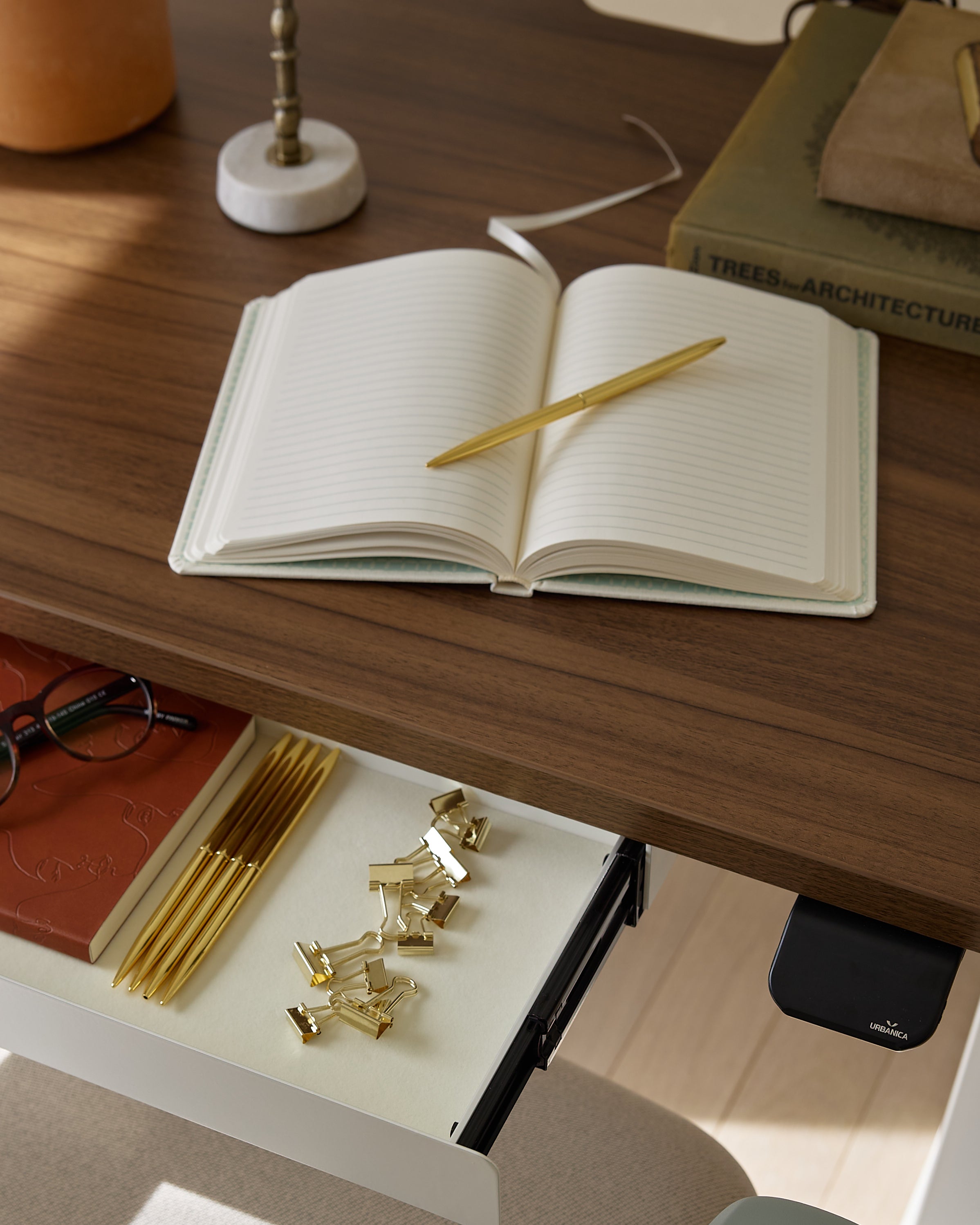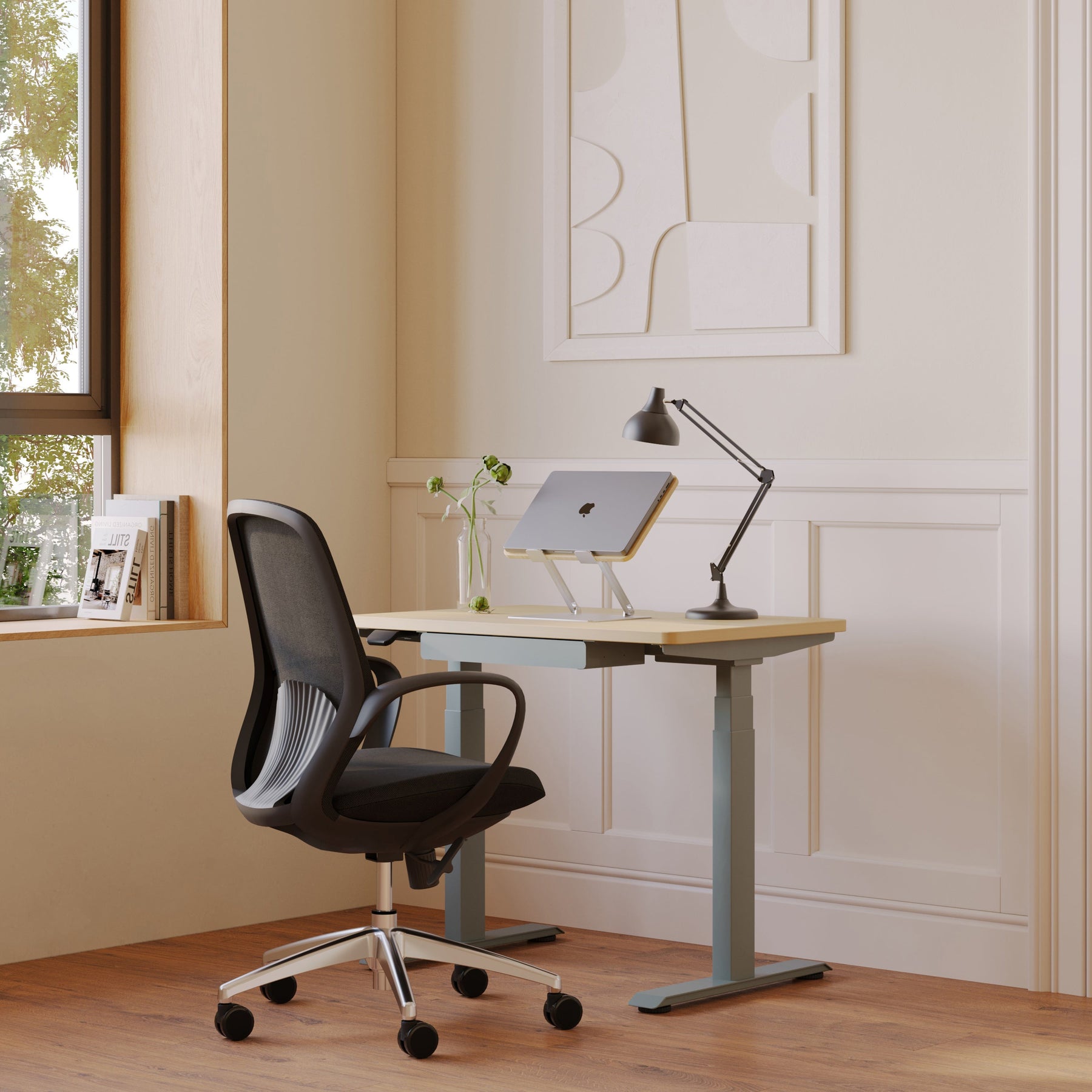Get 10% off your first order
Find the office furniture that’s designed to match your style, comfort, and needs perfectly. Subscribe
Standard Chair Height for Desk Setup Made Simple

Visit quiz page to see how we makes it easy to create an inspiring workplace


When you spend long hours working, studying, or creating, the desk you choose matters a lot. A good desk can help you concentrate better, reduce discomfort, and make your space feel more inspiring. One keyword that many people search for is Office Desk Rhode Island — it tells us they want a desk that brings focus, comfort, and quality. If you’re wondering how to pick a desk that really helps you focus you’re in the right place.
Bad posture or uncomfortable chairs that make you fidget.
Cluttered or poorly organized workspace.
Desk is too low or high, making wrists, neck or back hurt.
Sitting all day without changing position.
Poor lighting or glare on your screen.
When these show up, even a nice desk won’t help much. But when you choose well, the desk becomes part of the solution.
When people search for Office Desk Rhode Island, they’re often looking for something more than just a table—they want a desk that supports productivity and well-being. Here are some ways the right desk helps:
Ergonomics and posture
If your desk supports a comfortable setup—monitor at eye level, elbows at a right angle, feet flat on the floor—your body can relax. Less muscle tension means fewer breaks caused by pain or discomfort. With an Office Desk Rhode Island built for ergonomic use, you reduce distractions caused by aches and pains.
Alternating positions
Using a desk that lets you sit sometimes and stand sometimes breaks up fatigue. Standing desks help reduce the risks that come from sitting too long. Studies show switching between sitting and standing can help improve energy, ease back pain, and boost focus.
Space and organization
A desk with enough surface space and storage helps you keep only what you need within reach—pens, laptop, notebook—while minimizing clutter. When everything is organized, your brain doesn’t need to work as hard to find things, letting you stay in the zone.
Good materials and design
Solid top, stable legs, adjustable height, cable management—these details matter. A shaky or poorly built desk distracts you. A well-built Office Desk Rhode Island feels sturdy, looks pleasing, and supports focus.

Below are features that help you focus better. When you shop, consider these carefully. If you’re looking for Office Desk , these features will make a big difference.
Feature |
Why it helps your focus |
|---|---|
| Height adjustability (sit-stand) | Allows switching posture; reduces fatigue. |
| Proper depth/width | Enough space for monitor, keyboard, workspace without crowding. |
| Cable management / clean design | Fewer distractions, no cable mess. |
| Sturdy build | Minimizes wobble so you’re not correcting movements. |
| Good lighting integration or space for lighting | Avoid glare or shadows that strain eyes. |
| Storage compartments or shelves | Keeps tools close; limits getting up often for things. |
| Material / finish | Natural wood, matte surfaces, or smooth finish can feel calm; shiny or reflective surfaces can distract. |
Here are some desk styles that, when chosen well, support better focus. Often people combining features for Office Desk pick from these.
Standing desk / sit-stand desk: Lets you alternate between sitting and standing. Great for long productivity sessions.
Mini standing desk: Smaller footprint, often used as an add-on to raise monitor. Good if you have tight space.
Standard office desk with ergonomic layout: Traditional desk with enough space, proper height, good drawers or shelves.
Compact or corner desk: For small rooms or shared spaces. If compact, prioritize stability, good lighting, and clear space.

Alternate posture: Stand for 30 minutes, sit for 30. Repeat. Avoid standing all day.
Set up ergonomically: Monitor at eye level, feet flat, wrists straight. If you’re using a standing desk, use an anti-fatigue mat.
Keep your space tidy: Remove items you don’t need every day. Use trays, drawers, or shelves.
Good lighting: Natural light is best. If not available, use soft task lighting. Reduce glare on screens.
Take breaks & move: Walk, stretch, look away from screen every 30–60 minutes. Movement resets focus.
Mind tools and accessories: Supportive chair, good keyboard/mouse, cable organization all make small differences.
Choosing a desk that truly helps you focus isn’t just about looks. It’s about comfort, function, and making productivity easier. If you follow the features above, and pick a high quality Office Desk that supports your needs, you’ll get work done better, faster, and with less stress. You deserve a workspace that supports you—start building yours today.
If you’re sitting, your elbows should bend at about a 90-degree angle, with your feet flat on the floor and your monitor at eye level. If you’re standing, the same rule applies: your wrists should stay straight while typing. If your desk doesn’t adjust, you can use a monitor riser or keyboard tray.
That depends on how you work. A standing desk lets you switch between sitting and standing, which can help with energy and focus. A traditional office desk works well too, as long as it supports good posture and offers enough space. Many people like a combination—using a standing desk or a mini standing desk to keep flexibility.
Not really. Standing all day can cause just as much discomfort as sitting too long. The best approach is to alternate—stand for 20–30 minutes, then sit again. Movement and variety keep you more comfortable and help you focus longer.
Choose a desk that feels sturdy, offers enough space for your essentials, and supports ergonomic setup. Look for features like cable management, adjustable height, and clean surfaces that reduce distractions. These details make a big difference in how well you can focus.
A desk with drawers, shelves, or smart storage helps. Keep only what you need on the surface—like your laptop, notebook, or lamp—and store the rest out of sight. A tidy desk clears mental space, making it easier to concentrate.

Standard Chair Height for Desk Setup Made Simple

Ergonomic Computer Stand Ideas for Better Alignment

Most Comfortable Inexpensive Office Chair Features
Get 10% off your first order
Find the office furniture that’s designed to match your style, comfort, and needs perfectly. Subscribe
Leave a comment